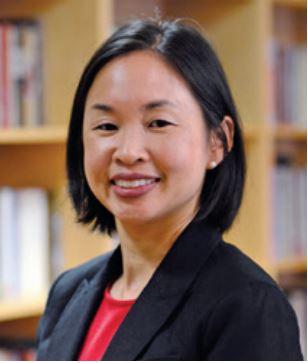A Life Course Framework For Resilience
Alumnae Spotlight on Dr. Sarah Tom '98
We had an opportunity to catch up with Dr. Sarah Tom ’98 to see where life had taken her since her days at St. Francis. To hear Sarah’s story is to understand the importance of resilience and learning from those that came before us, and appreciation of diversity.
As a student at St. Francis Catholic High School, Sarah’s health was fragile at best. By her junior year, she was experiencing debilitating and widespread pain and fatigue. Two weeks before donning her white robe for graduation, she was diagnosed with Fibromyalgia. A bright and focused student, Sarah was headed to UC Berkeley and confronted with figuring out what she needed to do differently in life to manage her disease and to succeed.
As an undergraduate at Berkeley, Sarah started to explore health and employment policy for young adults with disabilities as she was personally familiar with this area. An economics major, she wasn’t sure exactly what she wanted to do. But since economics used applied math (leveraging lessons she learned in Mr. Schwing’s math classes at SFHS), she was confident she could use this knowledge and apply it in many areas. She realized her interest lay in asking questions about people, disabilities, health and employment outcomes.
Being at Berkeley meant Sarah could spend time with her extended family in Davis, Sacramento, and San Francisco. Blessed with four grandparents who were healthy and aging gracefully, Sarah was inspired by their knowledge, experience, and stories.
Her innate curiosity led her to pursue a PhD in demography, a discipline that would allow her to answer broad questions about population health. “During graduate school, I started to conceptualize health as a process and to think about experiences in childhood and young adulthood that might have shaped my grandparents’ older adulthood, health and well-being, while also reading academic papers on such themes in my classes,” Sarah recalls.
After completing her PhD and Masters in Public Health at UC Berkeley, Sarah continued to use a life course framework to understand how experiences from early life to mid-life influence outcomes in physical functioning and women’s health and aging. After nine years in Berkeley, she knew she needed to see more of the world. She spent the next year at the Medical Research Council at University College London, followed by a year at the National Institute on Aging in Bethesda, MD. Her third year as a postdoctoral fellow was spent at Kaiser Permanente Washington Health Research Institute in Seattle. Here she had the opportunity to start to study dementia.
Currently, Sarah is an assistant professor in the Division of Neurology Clinical Outcomes Research and Population Science in the Department of Neurology at Columbia University. Most of her research focuses on understanding how social and health experiences over the life course contribute to the risk for and resilience against dementia in older adulthood.
“We know that the period of most rapid brain development is by age six,” Sarah cites. “We do not know if disadvantages early in life may lead to permanent brain and cognitive characteristics that influence dementia later in life. Alternatively, early life disadvantages may lead to disadvantages in adolescence and throughout adulthood, which then contribute to dementia risk.” For example, people whose parents are more highly educated on average have lower dementia risk. This relationship may exist because of benefits to early brain development that directly influence dementia, or because people with more educated parents then go on to achieve higher education, which then allows them to have better jobs and more cognitive stimulation during adulthood, which in turn decreases dementia risk.
This research is critical to identifying potential points of intervention to prevent or delay the onset of dementia. While early life may be a key time for prevention, we also need to understand what measures are effective at mid-life and in older adulthood to maintain and promote cognitive health and well-being. Sarah utilizes several large studies of dementia across the US to answer these questions, applying methods based in demography and epidemiology. She enjoys working with students as they refine methodology and integrate their results with previous studies to expand the knowledge base on dementia. Her career fosters her desire to collect and link innovative data from over the life course to further our understanding of when and how risk for and resilience against dementia develop in diverse populations. Sarah is particularly passionate about including women and the Asian and Pacific Islander and Latino/Hispanic communities in dementia research.
“IF SOMETHING SPARKS YOUR INTEREST, DON’T IGNORE IT.”
Sarah encourages today’s Troubies to think about how to challenge themselves and how to balance all the different demands on them. “I was very prepared for college,” Sarah stated. “A lot of the analytic and writing skills I use today grew from basics I learned at St. Francis.” She reflects on the path she’s taken and the circumstances and opportunities that came her way. “Have an idea of what you want to do, but also be open minded and think about different points of view, both in your professional and personal life,” Sarah exhorts. “If something sparks your interest, don’t ignore it. And periodically take a course in something different than what you are studying.” An area of interest for Sarah was a course she took in perinatal epidemiology that ultimately helped her see the impact of the early years and maternal health on older adult health. While leaving her family and friends in California was very difficult for Sarah, she is grateful for the enriching professional and life experiences that have followed.
Thinking back to her own life course, Sarah has learned to be more mindful of maintaining a balanced life and avoiding or mitigating Fibromyalgia triggers. She spends as much time with her family in California as she can, especially so that her toddler son Sacha can know his grandparents and great-grandmas.





